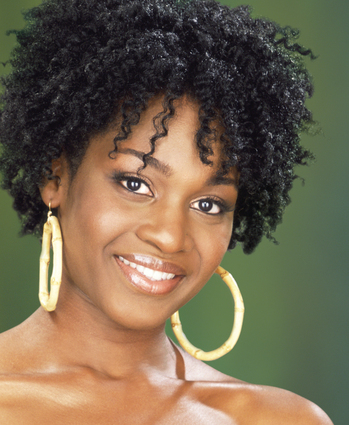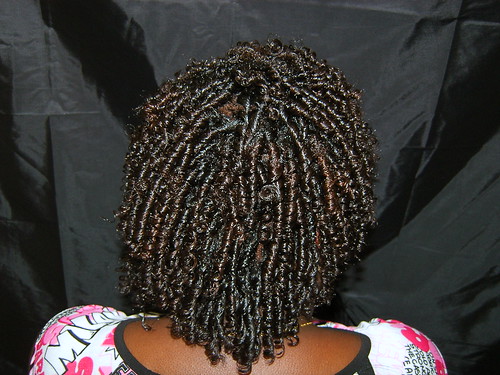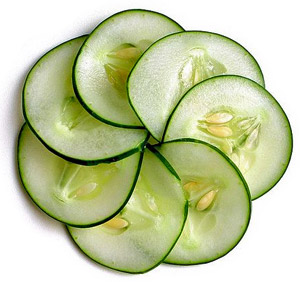Friday, August 26, 2011
More Harm Than Good
One of the main things I've learned in cosmetology school is how important it is to have product knowledge to inform clients of how their hair will benefit from using them, but one thing they don't teach us in school are harmful ingredients in hair products that could damage not just your hair, but also be hazardous to your health.
All beauty products are required to have a list of ingredients somewhere on the packaging. It is important to not only read the list, but also understand what you are reading so you will know what to avoid. The Federal Trade Commission orders that ingredients that are present in higher amounts in the product go to the top of the list. I've always been told the most important ingredients of a product are the first five on the list. Sometimes the active ingredients are on a separate list. Also, according the the International Nomenclature of Cosmetic Ingredients (INCI) system, ingredients have to be named using their scientific names and for plants, Latin names. Sometimes you'll find the English name in parenthesis, for example, Shea Butter is often listed as Butyrospermum Parkii (Shea Butter).
With all that being said, how do you know what is harmful to the hair??
Here are list of the most harmful ingredients found in hair care products
Sodium Lauryl Sulfate/Sodium Laureth Sulfate:
I have blogged before about the benefits of using sulfate free shampoo, so here is a reiteration of the harmful traits of sulfate. Both of these sulfates are cheap, harsh detergents that are found in the majority of shampoos. They are used to create lather or foam. A super lathering shampoo is not necessary to cleanse the hair and scalp. All that excess lather is just to make you think your shampoo is working properly. These sulfates are also commonly used in car washes and engine degreasers. They are generally derived from petroleum, also a harmful ingredient, and often cause eye irritation, scalp irritation and tangled hair.
Now to flip the script just a second on sulfate free shampoos...If you are using one, that's great, but just be careful!! Sometimes, when a company removes the sulfate from their product, they add salt (sodium chloride). Salt is just as bad, if not worse for your hair. Salt is abrasive or rough. If you shampoo your hair with a salt containing product, you're actually creating friction on your hair (think of an exfoliating scrub in your hair...no good!) Not to mention that it's strips the hair of moisture.
Parabens (methyl, propyl, butyl, and ethyl):
Parabens are added to hair products to act as a perservative, inhibiting microbial growth and extending the shelf life of the product. Unfortunately, parabens are also estrogenic and disruptive of normal hormone function. Exposure to these parabens has been linked to breast cancer. They've also been known to cause allergic and skin reactions.
Diethanolamine (DEA) and Triethanolamine (TEA):
These ingredients are synthetic emulsifiers and/or foaming agents. They are highly acidic and can cause allergic reactions, eye irritation, and dryness of the hair and skin. DEA and TEA are ammonia compounds, which are potent carcinogens or cancer causing. DEA can also strip away vital amino acids from the hair and the skin, like keratin. This will leave the hair feeling dry and unmanageable.
Formaldehyde:
This ingredients has become a hot topic since the emurge of the hair treatment the Brazilian Blowout. Which turns frizzy unmanageable locs into luxurious bone straight hair, but tests have determined that the product contains unsafe levels of formaldehyde or embalming fluid-a known carcinogen. Adverse reactions to formaldehyde can include allergies and affecting the nervous system.
Mineral Oil and Petroleum:
For years black women have caked "hair grease" onto their hair and scalp in hopes of achieving hair growth of some kind. I can remember my mother slathering Blue Magic onto my head every other day to help with "moisturizing" my hair and scalp. I don't mean to burst your bubble if this is still a practice you use today, but you are doing your hair and scalp no good with these products. These ingredients give the hair an artificial shine and are cheap to make and sell. Mineral oil and petroleum clog the pores on the scalp making hair growth null and void. They also coat the hair strand making it impossible for moisture to get in, which makes hair much more susceptible to damage and breakage in the long run.
Now, I know you may say, "But Tasha, trying to avoid these products can be expensive!" And you are right! Think about this though...if you ask someone who has had or is battling cancer if they would pay just a little bit more in order to avoid the ratchet disease, what do you think they would say? I'm thinking the answer would be YES! To step down from health concerns, just think about how the hair can thrive from not subjecting it to such cruel and unusual punishment.
So, it is up to you to READ THE LABELS of your hair care products and gain knowledge of the ingredients, with these harmful products lurking around every corner being advertised as "helpful" or "good" for our hair, ready to strike at any moment.
Labels:
Hair Benefits,
Hair Protection,
Healthy Hair,
Products
Thursday, August 18, 2011
Hair Styling 101
One of the top questions I get is "What can I do with my hair?" Whether you're new to the natural world, transitioning, sporting a TWA (teenie weenie afro) or a veteran rocking a massive natural fro, sometimes you get stumped on what kinds of styles are out there for you. Here are some step by step, easy do it yourself hair styles you can try at home.
I hope some of these styles are useful and you're able to come up with something to suit you and your personal style. Head down to your local hair supply store and stock up on accessories (scarfs, head bands, flower clips,etc.) to dress up your natural style.
Have fun and LOVE YOUR HAIR!!
Tuesday, August 16, 2011
The Benefits
I recently discovered a new site called benefitof.net. It gives the benefits of everything from overdraft protection to the benefits of Facebook. In the life style section under fashion and beauty, I found a lot of benefits of products we use regularly in our hair. So, I thought I'd share some of the stuff I read about.
Co-washing
The first thing I read wasn't a product, but something I know a lot of naturals do and that's co-washing. Co-washing is the act of shampooing your hair with conditioner instead of shampoo. One of the important benefits is you retain more moisture in your hair, since you wouldn't be stripping your hair of its natural oils with shampoo. This is especially good for overly dry hair. BUT please don't leave out shampooing your hair. The purpose of shampoo is to rid the hair of product build up and excess debris, which can clog the pores. Conditioners were not made to do that. With that being said, co-washing isn't bad, but shouldn't be the ONLY means of cleansing your hair.
Sulfate free shampoo
Both Sodium Lauryl Sulfate (SLS) and its close relative Sodium Laureth Sulfate (SLES) are commonly found in many household products like soap, shampoo, detergents, toothpaste and other products we expect to "foam up". These products, containing sulfate, have also been frequently reported to be the cause of eye irritation, scalp irritation, tangled hair, swelling of hands and face, and split fuzzy hair. These side effects are a reason in itself to use sulfate free shampoo. Another benefit would be reduced hair loss. Using sulfate causes the hair to be dull and breakable. Sulfate free tames the hair hardness and leaves the hair soft and easy to comb.
Extra Virgin Olive Oil
I have and will make frequent references to extra virgin olive oil (EVOO). It is one of my favorite hair staples. This is a very versatile product, used in everything from cooking to easing the noise of snoring. Packed full of minerals, vitamins and antioxidants, EVOO helps to provide the hair with nutrients needed for hair growth and helps to preserve the moisture in the hair. One of the things I do, is when using my leave in conditioner, I seal the moisture into my hair strands with a mixture of shea butter and EVOO. It's very affective.
Black Soap
I've never used this product, but have read numerous things about the benefits. A lot of naturalistas live by black soap. Black soap or African black soap is traditionally hand made in Africa from ingredients found in nature. Research has revealed that black soaps might contain many different ingredients, but majority of black soaps contain various oils, like the coconut oil, palm oil, palm kernel oil, shea butter and cocoa butter. They also contain ashes from different plants, like shea tree bark, banana trees, cocoa pods, and plantain leaves.
Black soap can be used for cleansing the hair. After cleaning use your regular conditioner for shiny lustrous beautiful hair.
Black soap contains a very high content of glycerin; it can easily absorb moisture from the air. To prevent it from spoiling due to humidity, black soap must be stored in a sealed plastic bag or dry container.
Tea Tree Oil
Tea tree oil is has antibacterial properties and act as a natural disinfectant. It is obtained by steaming leaves of the tea tree or Melaleuca tree and then compressing them to extract their oil. For hair, mixing tea tree oil into your shampoos and conditioners will help to get rid of dandruff. By acting as a disinfectant for the scalp, tea tree oil reduces the build up or residues around the follicles allowing for the free flow of sebum, hair's natural oil, into our hair shaft. Also, by reducing the inflammation around the follicles, tea tree oil promotes regeneration of existing hair while promoting new growth.
MSM
Methylsulfonymethane, or MSM, is a form of sulfur used to maintain healthy cells, organs, tendons, hair, skin and nails. I remember as a child my mother slathered Sulfur 8 and Glover's Mange onto my scalp regularly. I can't recall ever suffering from dandruff as a child. Though it doesn't smell very pleasant there are several benefits for sulfur in the hair.
Regular use of MSN helps your hair grow faster and naturally. It revitalizes hair follicles by increasing circulation in the scalp, thereby eliminating waste and toxins. It also assists essential nutrients like calcium, pantethol, and biotin to build strong hair.Studies suggest that MSM increases production of keratin, the protein found in hair fibers responsible for healthy hair. It not only prevents hair breakage, but is also beneficial for glossy hair as is makes your hair follicles flexible.
Onions
The last one that I want to share with you is the foulest of them all, but beneficial. Not only for eating purposes, onions have antifungal and antibacterial effects that make them useful for hair treatments and skin care. Studies have shown that applying onion juice to the scalp twice a week for a period of time will encourage hair growth. The sulphur contents of the onion regenerates the hair follicles, promoting hair growth.
These are just a select few of many benefical things out there for healthy and happy hair. Check out the site for yourself, benefitof.net.
Wednesday, August 10, 2011
Homemade hair recipes
Here are some easy to make at home hair recipes. You may have some of the ingredients right in your kitchen. The essential oils can be purchased at a health food store or online stores. Essential oils are very powerful and would have to be diluted, usually with a carrier oil like olive oil or almond oil. You don't have to follow the recipes to a tee. You can tweak them to fit your hair needs. I haven't tried all of these, but have read great things about them. I may have mentioned some of these in other posts as well.
1 cup warm water
mix the ingredients and pour onto shampooed hair OR you can rinse your hair and pour the clarifier onto your hair before you shampoo and condition. I've done both ways and they work either way. Don't worry about the smell, if you use it after shampooing. It will dissipate as it dries. This mixture will help balance out your pH and remove product build up.
Hair Clarifying
1/2 tablespoon apple cider vinegar1 cup warm water
mix the ingredients and pour onto shampooed hair OR you can rinse your hair and pour the clarifier onto your hair before you shampoo and condition. I've done both ways and they work either way. Don't worry about the smell, if you use it after shampooing. It will dissipate as it dries. This mixture will help balance out your pH and remove product build up.
Honey and Olive Oil Conditioner
3 teaspoons honey
1/4 cup of extra virgin olive oil
Heat the honey in a bowl, not too hot. Add olive oil. Work through the hair using small amounts at a time. I usually dampen my hair with warm water to help it glide on easier, but you can put it on dry hair. Place a shower cap on your head for 30 minutes. Shampoo and condition as normal. This helps to make the hair softer and shinier.
Egg and honey treatment
Egg yolk provides protein, which strengthens the hair. Honey gives hair a nice sheen. Almond oil is rich in vitamins and minerals and lastly yogurt promotes hair growth and makes the hair easier to comb. This recipe makes for a wonderful hair cocktail.
1 tablespoon honey
1 egg yolk
1/2 teaspoon almond oil
1 tablespoon natural (plain) yogurt
Cucumber/Oil Treatment
I haven't tried this personally, but I've read that it's good for frequent swimmers.
1 egg
1 egg shell's worth of extra virgin olive oil
1 quarter of a peeled cucumber
Blend ingredients. Spread evenly through your hair and leave on 10 minutes. Rinse thoroughly and style as usual.
Itchy Scalp Treatments
I get a lot of calls about what to do for itchy or dry scalp. I have been on a man hunt to find different remedies. Here are few that I've found to be helpful.
Oatmeal
5 drops of rosemary oil
5 drops of lavender oil
Soak oatmeal in water for 20 minutes and strain. Add the oils. Rub liberally onto the scalp. Let it sit for as long as needed and rinse thoroughly. Shampoo and condition as normal.
Two drops peppermint oil
1 cup of water
Massage the scalp gently with this mixture to help with dry scalp.
Mix equal parts olive oil, almond oil and coconut oil. Warm the mixture and apply it on the scalp to relieve itchiness caused by dandruff.
Mix equal parts rosemary oil, carrot oil, jojoba oil and sage oil. Massage the scalp gently to relieve itchiness.
One avocado
2 bananas
Mix together. Rub through hair and scalp. Leave in for 30 minutes rinse thoroughly.
Hair Growth Mixture
This mixture will help in stimulating the scalp and promoting hair growth. It can be used in different sections or all over. Consistent applications is the key for this mixture.
2 oz pure vitamin E oil
2 oz castor oil or jojoba oil
15 drops rosemary oil
15 drops peppermint oil
Put ingredients in a container and mix well. Use your fingertips to dip into the mixture and massage the area. IF you want a more solid mixture you can use 4 oz of coconut oil instead of the castor or jojoba oil. This is a great way to treat thin hair lines. You can use this nightly, but be sure to keep the hair shampooed regularly so that it won't clog the hair follicle--which can cause itchiness and slow hair growth.
Let's talk about Vegetable Glycerin for a second...
I've recently discovered this product and have fallen head over heals in love with it!!
Vegetable glycerin is a by-product of the soap making process. It is known for being a humectant, meaning it attracts water or moisture. You'll find glycerin in a mind boggling amount of skin and hair products. You can't just coat your hair with it or you'll get a sticky mess, but using it along with other products makes for excellent relief on those extra dry days.
Here are a couple of spritzes you can make:
3 tablespoons vegetable glycerin
2 tablespoons honey
1 tablespoon aloe vera juice
2 tablespoons extra virgin olive oil
1/2 cup water
1 spray bottle
Pour all the ingredients in the bottle. Shake really well to disperse honey and olive oil throughout the water. You'll have to shake it with each use.
For a quick and easy hydrating spray mix equal parts vegetable glycerin and water into a bottle. Add 3 drops of an essential oil (rosemary, lavender, tea tree or cedarwood). Spray on the hair as needed.
These are just a few of many recipes out there for healthy and happy hair. I will continue to post them as I continue to discover them. As I said, you can mix and match ingredients to come up with products that work best for you.
Labels:
Healthy Hair,
Homemade hair treatments,
Recipes
Subscribe to:
Posts (Atom)






























